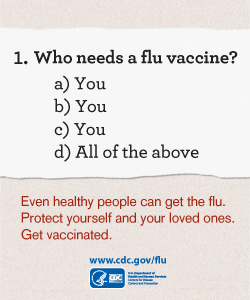>
Amigo visited our family doctor last week to get his ear checked out and flushed out. The nurse asked him if he’d had a flu shot. He replied in the affirmative, that he’d got it at school, from the school nurses that serve the residential school for the blind. We didn’t have an exact date, but we estimated late October.
Amigo is wise beyond his 20 years when it comes to flu. He knows how miserable a case of influenza can be. He’s always been one who doesn’t get sick often, but when he does, he gets really, really sick. He signed up for the flu shot at school registration, got our signatures on the approval sheet (even though he’s old enough that he didn’t need them), and willingly got his flu shot. He knows what the Center for Disease Control (CDC) says: The flu vaccine is your best protection against the flu.
Timing of influenza outbreaks is unpredictable. I will always remember the impact of H1N1 on my fourth grade students. My class had at least five and as many as ten students out each day for a time period of three to four weeks. That outbreak came in October, but outbreaks can occur as late as May.
Flu vaccines are usually available in early autumn and remain available for several months. Last year, the flu peaked in February. A January flu shot isn’t too late.
Not all families have good coverage and a family doctor, and not everyone has access to a school nurse, either. If you’d like to find a location near you, look here.
Information and web links from the Center for Disease Control: I received no monetary compensation for writing this post. I wrote it to bring valuable information to my readers.

